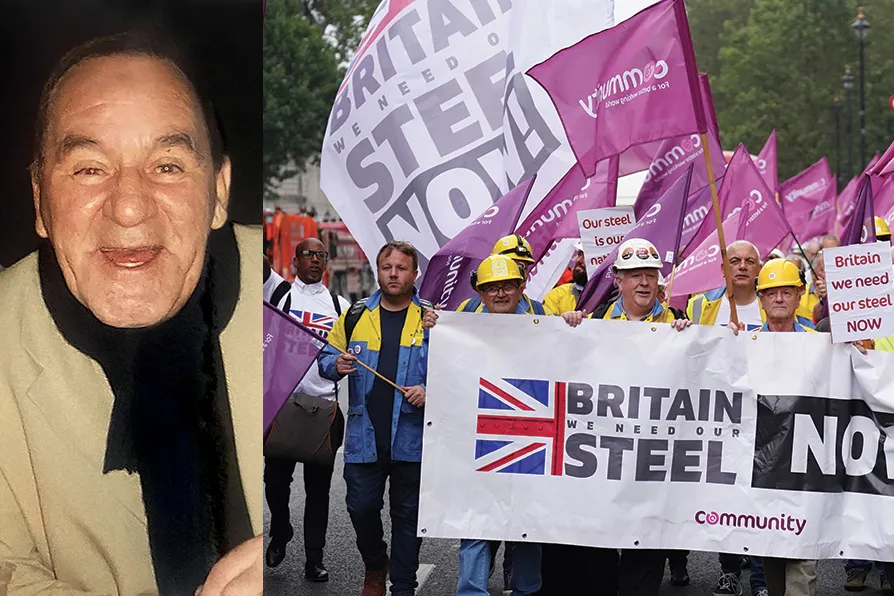Labour’s persistent failure to address its electorate’s salient concerns is behind the protest vote, asserts DIANE ABBOTT

 THE STRUGGLE CONTINUES: Steel workers and union officials protest outside the Houses of Parliament on June 28 2023 / J Milligan pic: author supplied
THE STRUGGLE CONTINUES: Steel workers and union officials protest outside the Houses of Parliament on June 28 2023 / J Milligan pic: author supplied
by Matt Kerr
A FEW months back, I was summoned to appear before the weekly meeting of the three amigos in Motherwell.
It was there, with his comrades Alan Raby, and Hughie McLaughlin that I first had the chance to speak with Jimmy Milligan. Decades earlier, the three had played their part in securing the future of the Dalzell plate mill, a plant whose future once again hangs in the balance.
Hours passed in the blink of an eye, as the story was told of how a group of trade unionists managed to inveigle their way into the Scottish Tory Party in Perth and talk the very people who had privatised the industry just a few years earlier into backing its future.
Three decades on, their successors at the plant are making similar arguments to government for support, this time to produce the steel needed to build the wind turbines to serve the country’s energy needs as well as that old staple of military-grade material which today’s government holds as dear to their hearts as those of Margaret Thatcher and John Major.
As a communist, Jimmy was well aware of the patterns of history, saw the devastation brought to Lanarkshire as the mines began to close and other heavy industry with it, a tragedy he and his comrades were determined wouldn’t be repeated as farce at Dalzell as it had been at nearby Ravenscraig.
That battle was not the first, nor would it be the last Jimmy would take on. Encouraged and inspired by one-time neighbour, communist councillor, and AEU convener at Dalzell Jimmy Sneddon, he understood that both the struggle and the responsibilities of a trade unionist and communist did not end with his shift at the steel mill.
For the man who, like so many working people of his generation, was brought up in a tenement with an outside toilet shared with a dozen other families, housing remained a cause close to his heart long after he had secured the coveted front and back door in 1957.
He actively opposed that act for which so many young people today are paying the price — the right to buy — but was every bit as active on the equally important but less high-profile issues of maintenance and investment; the very heart of making council housing work for working people rather than becoming the ghettos the free market would hand us.
Within months of British Steel’s privatisation in 1988, another threat loomed in Scotland with the introduction of the Poll Tax. Again, Jimmy was at the forefront of organising locally alongside trade union comrades at the STUC to defeat the attack on working people which would ultimately bring down a prime minister.
When the time came to join the tens of thousands marching against the Iraq war and to drive Tony Blair out of Glasgow, Jimmy was there, even if ill health by this time meant having a couple of stops on the road to catch his breath at the Horseshoe and the Scotia.
Throughout it all, he had a reputation too as a doughty campaigner for our newspaper, cajoling sales and donations from comrades at STUC meetings as well as at his local branch with a combination of humour and sheer persistence which became the stuff of legend.
One comrade told me his commitment to the selling and rallying support for our paper was such that “these days it might be considered workplace harassment,” a pattern of behaviour he thankfully continued long into retirement.
As regular as clockwork, our fundraising team could expect money raised by the three amigos to roll into our Fighting Fund, and even as he faced his final illness, the support continued from the hospital bed, where he drew comfort from (where else?) Nikolai Ostrovsky’s seminal socialist realist novel How the Steel was Tempered.
“Man’s dearest possession is life.
“It is given to him but once, and he must live it so as to feel no torturing regrets for wasted years, never know the burning shame of a mean and petty past; so live that, dying he might say: all my life, all my strength were given to the finest cause in the world — the fight for the liberation of mankind.”
Here’s to Jimmy Milligan: Communist, Trade Unionist, Father, Grandfather, and fighter for a better world one street at a time.
His part in the struggle now at an end, it’s over to you.
The funeral takes place today, Wednesday, at Holytown Crematorium, Memorial Way, Holytown, Motherwell at 1.30pm.

PAWEL WARGAN juxtaposes the thriving industrial centre Jiayuguan in China, with the prevailing images of decaying East European great industrial cities

From Workers’ Memorial Day to May Day rallies, TOM MORRISON examines the real challenges facing the labour movement as Reform UK’s glossy literature exploits legitimate grievances in traditional left strongholds












